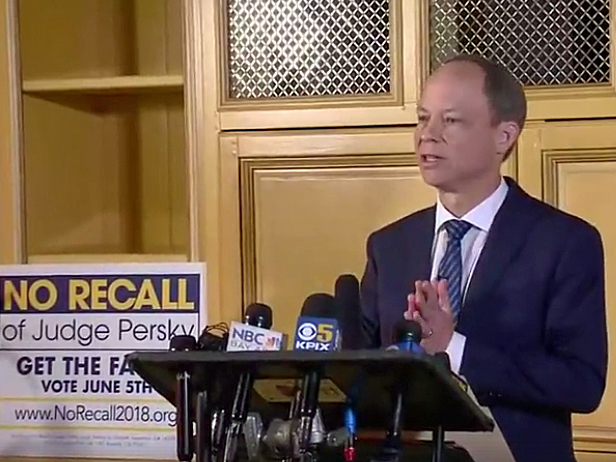We all have noticed how our modern social media environment almost seems to invite the strongest, even harshest, statements. These are angry times and anger never seems to be silent these days.
But one person’s angry assertion could be another’s call to action.
Locally, there may be no more complete example of how social media anger can translate into action than the effort to recall Santa Clara County Superior Court Judge Aaron Persky because he issued a sentence in a rape trial that was widely criticized as too lenient. Remarkably, this election has become a national news story, as evidenced by the news conference Persky held yesterday, which drew dozens of TV cameras and reporters.
Two comments jumped out from Persky’s hour-long appearance. The first: “When public opinion influences a juror’s decision or a judge’s decision, it corrupts the whole system.”
That California judges at every level are subject to a vote of the public has public corruption at its root. In the earliest days of the United States, all judges were appointed for life, a circumstance that invited judicial misconduct, including bribes and favoritism. Reforms led to the election of judges and when California’s judiciary was established in 1849, the election system was adopted. On more than one occasion, California voters have rejected efforts to appoint judges rather than elect them.
Clearly, Californians value being able to vote on judges, although the vast majority of them run unopposed. Paradoxically, what we often say we value most in judges are integrity and independence.
On the Peninsula, judicial elections have not been popularity contests, even on those occasions when a judge made an unpopular decision or handed down a controversial sentence. Judges have been ousted at the ballot box, but at the heart of those campaigns has been questions of dereliction of duty, inappropriate conduct and unjudicial behavior. In essence, ousting a judge, particularly on the Peninsula was equated with impeachment – misconduct in office was considered a critical threshold.
As Persky suggested, should he be recalled, we will be entering a new era in which a judge is removed for following the judicial sentencing guidelines. The real problem may well be with the law, not the judge. But anger is easier to direct if the target is an individual and not a system.
The other comment by Persky that jumped out from yesterday’s news conference was this: “I was surprised at the amount of the backlash.”
And that leads us to a remarkable turnabout by our own little Palo Alto Daily Post, which began years ago as kind of spunky but has been largely grumpy and pugnaciously anti-government for the last several years.
The Post, it can be stated fairly, was happily and strongly in the vanguard of the backlash, running a headline nearly two years ago that read: “Judge Aaron Persky should be fired.”
The accompanying column lectured Persky on how he should have been thinking about this case.
The remarkable part of this came in an editorial last week in which the Post reversed itself and now opposes the recall of Persky because, while the sentencing was a mistake, “it would be an even greater mistake to give up the concept of an independent judiciary.”
The Post editorial even took a half-hearted swipe at admitting it might have made a mistake: “But we never anticipated that the campaign to remove Persky would result in a lynch-mob movement that threatens the independence of the judiciary.” Not much of an admission that they might have been wrong.
The Post gets credit for a public reversal – it could have remained quiet. But it would be more admirable if the initial call to “fire” Persky were not typical rhetoric from the Post, where thoughtfulness tends to be afterthought. Better late than never, I suppose.
Contact Mark Simon at mark@climaterwc.com.






